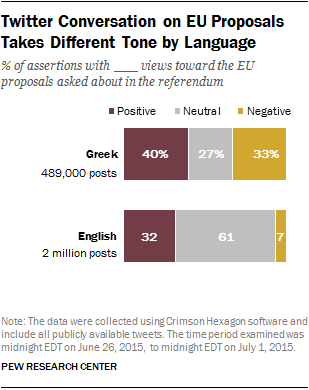
Leading up to the Greek referendum this Sunday over whether to accept the European Union’s austerity measures, the Twitter conversations in Greek and English reveal major differences in both tone and focus, according to a new Pew Research Center analysis.
Among Greek-language tweets studied, 40% of the conversation included positive expressions about the EU proposals on the referendum calling for a financial bailout that would likely include new austerity measures, while 33% was negative and 27% was neutral. The stakes are high and yet also still unclear – a “no” vote could lead to a possible exit from the eurozone or a fresh start for the negotiations.
A majority of the English-language conversation about the referendum was neutral (61%), but within the portion of the conversation that contained any tone, the positive (32% of the total conversation) outweighed the negative (7%).
Our analysis included nearly 2.5 million tweets in both languages posted between June 26 (following the prime minister’s referendum announcement) and July 1.

Although not a replacement for scientific public opinion polling, social media analysis can provide valuable insight into public views on a subject. According to our surveys, 23% of online adults use Twitter in the U.S. It’s unclear what share of the public in Greece uses Twitter, but nearly a third of the Greek population uses social networking sites, including Twitter, at a daily or near-daily rate, according to the latest Eurobarometer. (Our analysis did not compare Twitter users based on their location, but rather, by language.)
In English, the Twitter conversation mainly focused on the country’s loan defaults, the multinational negotiations and the late payments to the International Monetary Fund (IMF) – which together accounted for 41% of tweets analyzed. Nearly a quarter (23%) of the English-language conversation focused on the bank closures on June 29. The conversation about the decision to hold the referendum and the impact of Greece’s debt crisis on foreign markets each accounted for 15% of the conversation, while 7% focused on a crowdfunding campaign started in London that aimed to raise money to bail out Greece.
In Greek, the Twitter conversation was dominated by the focus on bank closures and capital controls, which resulted in long lines at ATMs around the country. About half (52%) of the Twitter conversation was about the bank holiday and the strict limits on cash withdrawals.
About one-third of the conversation (30%) was focused on the upcoming referendum, while 15% of the discussion was dedicated to the default and the late payments to the IMF. Just 2% of the conversation was related to the impact that Greece’s debt crisis has on foreign markets. The crowdfunding Kickstarter campaign was almost not existent.
What is behind the differences between the Greek and English conversations? It may be that those tweeting in Greek are more likely to be experiencing the events taking place in Greece firsthand, whereas those tweeting in English may be following the story from abroad. Regardless of language, neither conversation is unanimous in its hopes for the Greek future.
Note: See our full methodology.
